By pursuing an Agile Scrum Master certification, you'll gain insights into the best practices of Agile and Scrum methodologies, empowering you to effectively lead teams, facilitate Agile processes, and drive successful project deliveries. The certification serves as a valuable acknowledgment of your expertise in implementing Agile best practices in real-world scenarios.
Most Agile Scrum certification programs offer a structured curriculum that covers the fundamental principles, values, and practices of Agile and Scrum. These programs provide in-depth training on roles, events, artifacts, and techniques used in Scrum, allowing you to understand the best practices thoroughly.
Here's a more detailed explanation of what you might learn from a Scrum Master Certification:
Scrum Framework:
· Understanding the core principles and values that underpin the Scrum framework.
· Familiarity with the three pillars of Scrum: transparency, inspection, and adaptation.
· Knowledge of the roles, events, and artifacts that constitute the Scrum framework.
Scrum Team Roles:
· In-depth knowledge of the three key roles in Scrum: Scrum Master, Product Owner, and Development Team.
· Understanding the responsibilities and interactions of each role within the Scrum framework.
· Insights into the importance of collaboration and communication among team members.
Scrum Artifacts and Events:
· Understanding Scrum artifacts, such as the Product Backlog, Sprint Backlog, and Increment.
· Insight into the purpose and use of Scrum events, including Sprint Planning, Daily Scrum, Sprint Review, and Sprint Retrospective.
· How to effectively use tools like the Scrum board, burndown charts, and other visual aids to manage and communicate progress.
Applying Scrum:
· Practical application of Scrum principles to real-world projects and scenarios.
· Techniques for facilitating Scrum events and promoting collaboration among team members.
· Skills in coaching and guiding teams to self-organize and continuously improve their processes.
· Strategies for applying Scrum in various organizational contexts and adapting it to different project types.
Soft Skills and Leadership:
· Developing effective communication and collaboration skills to work with team members, stakeholders, and other Scrum Masters.
· Leadership and coaching techniques to support the team in adopting Agile practices and principles.
· Strategies for handling conflicts, removing impediments, and creating an environment conducive to Agile values.
Agile Mindset:
· Instilling an Agile mindset focused on delivering value, embracing change, and promoting a culture of continuous improvement.
· Understanding the importance of customer feedback, adaptability, and iterative development in Agile projects.
Overall, Agile and Scrum Certification provides a holistic understanding of the Scrum framework, the roles involved, the artifacts used, and the events that make up the Scrum process. It also equips individuals with practical skills to apply Scrum principles in diverse situations and fosters an Agile mindset for effective collaboration and project delivery.


No comments yet